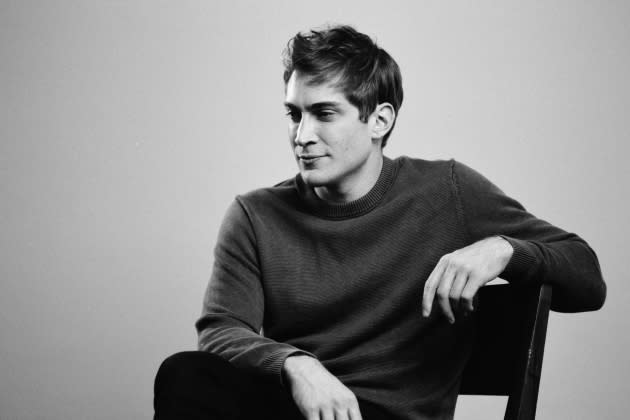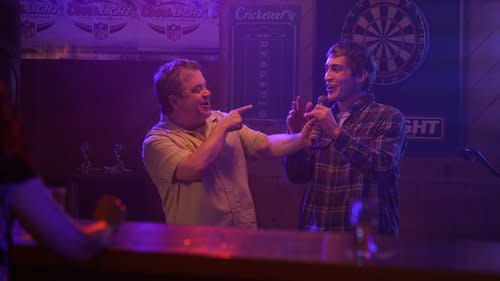How James Morosini Turned Being Catfished by His Father Into New Film ‘I Love My Dad’

James Morosini really does love his dad, and he proves it when his father calls in the midst of our conversation. Morosini takes the call and explains he’s on an interview. “I’ll call you back,” the younger Morosini says before adding: “Love you.”
The complicated father-son relationship inspired Morosini’s acclaimed new film, “I Love My Dad,” which hits theaters this week and arrives on VOD Aug. 12 after winning both the grand jury prize and audience award at this year’s South by Southwest Film Festival. Patton Oswalt stars as Chuck, a man who is cut off by his son Franklin (played by Morosini) and creates a social media profile based on a waitress he knows, Becca (Claudia Sulewski.) Though Chuck is just trying to connect with Franklin, his son ends up falling hard for Becca – and Chuck goes to increasingly elaborate lengths to keep up the ruse.
More from Variety
Patton Oswalt Talks 'I Love My Dad,' Cringe Comedy and 'Cancel Culture'
Patton Oswalt, Brandon Flynn, Hamish Linklater Among Seven Cast in Apple Series 'Manhunt'
Magnolia Pictures Buys Patton Oswalt Catfishing Comedy 'I Love My Dad' (EXCLUSIVE)
Hearing the premise, people tend to laugh or wince — sometimes both. It’s a delicate balance kept afloat by Morosini’s skilled script and direction as well as a fantastic ensemble that also includes Amy Landecker, Lil Rel Howery and Rachel Dratch. It’s also based on a true story – in real life, Morosini’s father sent him a friend request under the guise of an attractive young woman. And while it does make for some uncomfortable (if hilarious) on-screen moments, it’s also surprisingly empathetic toward all of its complex characters.
Most recently seen in “The Sex Life of College Girls,” the 32-year-old actor’s previous venture behind the camera was the 2018 comedy “Threesomething,” which he says was shot on a budget of “around $10,000.” So while helming “I Love My Dad” was a steep learning curve — Morosini calls it “the hardest thing I’ve ever done” — he says it was also “the most rewarding.”

Magnolia Pictures
I know this is based on something that really happened to you, but from what I understand, your real story didn’t go quite this far.
It went farther than I would have liked. (Laughs.) I kind of took a kernel of what happened and tried to extrapolate upon it and asked myself what would I have done if it had gone even further. Emotionally, the whole movie is very, very true.
This happened quite a while ago, around the age of 20?
Yeah. I stopped talking to my dad — he lied about something and we had a big fight and I cut him out of my life. I think when you’re 20, you see things in a very black-and-white way and I was very absolute about things. At that point, I didn’t know how to set clear boundaries in my life. I got home one day and this really pretty girl had sent me a friend request. She was awesome and had all the same interests and all these amazing pictures. And then I soon found out it was my dad.
That’s horrible, but did the writer in you immediately realize it was a good story?
I definitely recognized something in there at the time. I’m really interested in stories being told from a perspective we wouldn’t normally see. For me, that’s the value of storytelling. I’m somebody that likes to consider the other perspective and try to understand what people are doing. So I felt like it was a worthwhile exercise in empathetically exploring what he must have been going through at the time and why he would ever do this.
The film is shockingly empathetic toward Chuck, while never pulling any punches about how terrible he can be.
I can understand why a lot of people see Chuck as a terrible father or horrible person, but I don’t really see people in that way. I think people have limited tools and we use them how we’ve been taught to use them. Nobody knows how to be a perfect parent, especially if they didn’t have perfect parents. So for me, the is about forgiving people for being limited and trying to find ways to connect with them, even when it seems impossible to do so.
Did you talk to your father when you were writing to really get his perspective?
I did quite a bit. I went to Colorado and I spent a lot of time with him. He also gave me his journals from earlier in his life, and those were so informative in crafting the character’s perspective as I was writing it.
Did he speak to Patton before shooting?
No, I think Patton wanted it to be a separate character than my actual dad, so I understand. And really, Chuck is quite different from my dad.
I understand that originally you didn’t intend to act in the film, but Patton encouraged it?
Yes. We were talking, and the idea of it came up. And then I went to his house and we read a few scenes on camera, just to see if it made sense. And we both enjoyed acting together. I’m ultimately glad I did, just because it made it so much more personal for me. And because I was able to do things in it that I wouldn’t necessarily know how to convey to an actor.
There’s so many moments where the audience is on edge wondering how far things are going to go. It walks a precarious balance; how did you master that tone? Was it in the writing or shooting, or even the editing?
I think it was a mix of all of those things. In the writing, I felt let’s go as far as we can. And then we can pull it back if it doesn’t work. When we were shooting, it was important to make sure that the performances aligned and Chuck could never be having too much [fun] with his deception. He always needed to be kind of tortured by going through with this with only glimmers of satisfaction, because he’s getting closer to his son, not because he’s enjoying pretending to be this person. That’s where Patton and Claudia are so invaluable with these performances because she’s saying what Patton is typing and it has to be so precise. In editing, it was about the juxtaposition between the characters. When Franklin is having his best moments, Chuck is having his worst moments. Because for Franklin, the more intimate he is with Becca, the happier he is, and the more intimate Chuck is having to be as Becca, the more tortured and freaked out he is.
Are you okay with the film being called a “cringe comedy”?
Sure. You can put something down by saying it’s cringe but if the intent is for it to be cringe, then I guess it’s a compliment. It’s like calling a horror movie scary — for some people, it’s going to be too scary. And for some people, this movie might be too cringey. But for people who like that, I think they’ll really enjoy it.
I’m a big fan of Reddit cringe, which is a subreddit of Reddit where it’s just all the cringy best things ever. I’ve been trying to understand why I’m so interested in cringe. I think it’s because it’s just so relatable. We can see somebody working too hard to or lying to make it seem like they’re someone else, and it’s very human. It’s so honest it almost hurts.
Of course I have to ask: what does your real dad think of the movie?
He saw it for the first time at South By and I was very nervous about showing it to him. I was worried that he wouldn’t like it, or he would take it personally or get his feelings hurt. And then halfway through the movie, he leaned over and said: “This is a really good movie!” And he has a great sense of humor — I think I get my sense of humor from my dad. And so he loves the film and gets it and is able to laugh at himself. I’m proud of him, that he’s able to have a sense of humor about this. This whole process has strengthened our friendship and our relationship. And, you know, the title of the movie is true. I love my dad.
Best of Variety
Sign up for Variety’s Newsletter. For the latest news, follow us on Facebook, Twitter, and Instagram.
